- Clone
- A16125E (See other available formats)
- Regulatory Status
- RUO
- Other Names
- Protein DJ-1, oncogene, DJ1, PARK7, Parkinson disease protein 7, Parkinsonism-Associated Deglycase, HEL-S-67p, epididymis secretory sperm binding protein Li 67p, GATD2, Protein Deglycase DJ-1
- Isotype
- Mouse IgG2b, κ
- Ave. Rating
- Submit a Review
- Product Citations
- publications
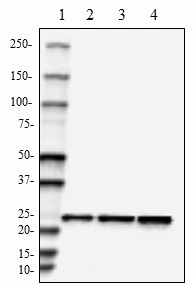
-

Western blot of HRP anti-DJ-1 (PARK7) antibody (clone A16125E). Lane 1: Molecular weight marker; Lane 2: 20 µg of recombinant human DJ-1 (PARK7) protein (Cat. No. 843401); Lane 3: 20 µg of normal human brain lysate; Lane 4: 20 µg of Parkinson’s disease brain lysate. The blot was incubated with 1.0 µg/mL of the primary antibody for 1 hour at room temperature. Enhanced chemiluminescence (Cat. No. 426302) was used as the detection system. -

IHC staining of HRP anti-DJ-1 (PARK7) antibody (clone A16125E) on formalin-fixed paraffin-embedded normal human brain tissue. Following antigen retrieval using Sodium Citrate H.I.E.R (Cat. No. 928602), the tissue was incubated with 1 µg/mL of the primary antibody for 1 hour at room temperature. DAB was used for detection followed by hematoxylin and bluing solution counterstaining, according to the protocol provided. The image was captured with a 40X objective. Scale bar: 50 µm
DJ-1 (PARK7) belongs to the peptidase C56 family of proteins and is expressed in almost all human cells and tissues. DJ-1 is a multi-functional protein associated with mitochondrial function, mitophagy, and male fertility. It acts as an oxidative stress sensor, redox-sensitive chaperone and protease. Therefore, the protein has an important role in cell protection against oxidative stress and cell death. DJ-1 is also associated with prostate cancer, and specific mutations of the protein are linked to autosomal recessive, early onset Parkinson’s disease.
Product DetailsProduct Details
- Verified Reactivity
- Human
- Antibody Type
- Monoclonal
- Host Species
- Mouse
- Immunogen
- Recombinant Human DJ-1
- Formulation
- This antibody is provided in 50% glycerol in aqueous buffered solutions with preservatives.
- Preparation
- The antibody was purified by affinity chromatography and conjugated with HRP under optimal conditions.
- Concentration
- 0.5 mg/ml
- Storage & Handling
- Upon receipt, the antibody solution should be stored undiluted at -20°C, and protected from prolonged exposure to light.
- Application
-
WB - Quality tested
IHC-P - Verified - Recommended Usage
-
Each lot of this antibody is quality control tested by Western blotting. For Western blotting, the suggested use of this reagent is 0.2 - 1.0 µg per ml. For immunohistochemistry, a concentration range of 1.0 - 5.0 µg/ml is suggested. It is recommended that the reagent be titrated for optimal performance for each application.
- RRID
-
AB_2734642 (BioLegend Cat. No. 851504)
Antigen Details
- Structure
- Human DJ-1 is a 189 amino acid protein with an apparent molecular weight of 20 kD. The protein consists of 7 β-strands and 7 α-helices, and exits as a dimer.
- Distribution
-
Tissue distribution: Highly expressed in pancreas, kidney, skeletal muscle, liver, testis and heart. Detected at slightly lower levels in brain and placenta.
Cellular distribution: Mitochondria, nucleus, cytosol, plasma membrane, and extracellular. - Function
- DJ-1 functions as an oxidative stress sensor and redox-sensitive chaperone.
- Interaction
- PINK1, Parkin, EFCAB6/DJBP, OTUD7B, BBS1, HIPK1, CLCF1 and MTERF.
- Biology Area
- Cell Biology, Mitochondrial Function, Neurodegeneration, Neuroinflammation, Neuroscience, Neuroscience Cell Markers, Protein Misfolding and Aggregation, Protein Trafficking and Clearance
- Molecular Family
- Mitochondrial Markers
- Antigen References
- Gene ID
- 11315 View all products for this Gene ID
- UniProt
- View information about DJ-1 on UniProt.org
Other Formats
View All DJ-1 Reagents Request Custom Conjugation| Description | Clone | Applications |
|---|---|---|
| Purified anti-DJ-1 (PARK7) | A16125E | WB,Direct ELISA,IHC-P |
| HRP anti-DJ-1 (PARK7) | A16125E | WB,IHC-P |
Compare Data Across All Formats
This data display is provided for general comparisons between formats.
Your actual data may vary due to variations in samples, target cells, instruments and their settings, staining conditions, and other factors.
If you need assistance with selecting the best format contact our expert technical support team.
-
Purified anti-DJ-1 (PARK7)
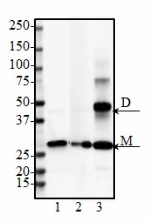
Western blot of anti-DJ-1 antibody (clone A16125E). Lane 1: ... 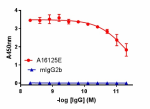
Direct ELISA of anti-DJ-1 antibody (clone A16125E) and isoty... 
IHC staining of anti-DJ-1 antibody (clone A16125E) on formal... -
HRP anti-DJ-1 (PARK7)
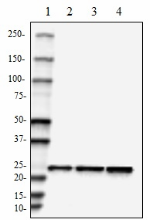
Western blot of HRP anti-DJ-1 (PARK7) antibody (clone A16125... 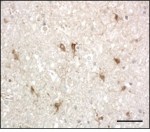
IHC staining of HRP anti-DJ-1 (PARK7) antibody (clone A16125...







Follow Us